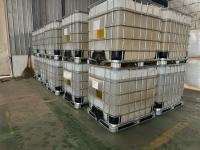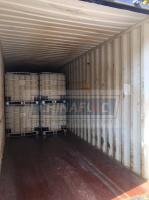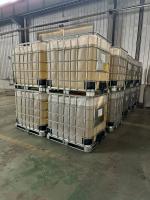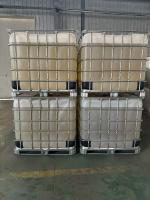Our Products
Product Center / Floquat fl2550 of polyamine equiavlent model can be replaced by Chinafloc polyamine series

Polyamine (Floquat FL2550) is a high-performance liquid cationic coagulant used primarily in water and wastewater treatment processes. Manufactured by SNF, Floquat FL2550 is part of the polyamine family—cationic polymers synthesized through the polymerization of amine-based compounds such as epichlorohydrin and dimethylamine. These polymers are highly efficient at destabilizing negatively charged particles in water, enabling rapid and effective clarification and separation of suspended solids.
The main application of polyamine (Floquat FL2550) is in solid-liquid separation, especially as a primary coagulant or coagulant aid in various municipal and industrial wastewater treatment systems. It is valued for its fast reaction rate, low sludge production, broad pH compatibility, and excellent performance when combined with flocculants such as polyacrylamide. Below is a detailed overview of the main uses and industries that rely on Floquat FL2550 to improve water quality, reduce operational costs, and meet environmental standards.
1. Municipal Water and Wastewater Treatment
a. Raw Water Clarification
Floquat FL2550 is widely used in municipal drinking water treatment plants to clarify surface water sources such as rivers, lakes, and reservoirs. These waters typically contain colloidal particles, algae, turbidity, and organic matter.
Floquat FL2550 acts as a primary coagulant, neutralizing the negative charges on colloids and forming easily removable flocs.
Benefits include:
-
Reduced turbidity and organic matter
-
Enhanced sedimentation and filtration
-
Less sludge compared to traditional metal salt coagulants (like alum or ferric chloride)
-
Compatibility with a wide range of raw water chemistries
b. Municipal Sewage Treatment
In municipal wastewater treatment systems, especially in secondary and tertiary stages, Floquat FL2550 is applied to enhance clarification, sludge thickening, and nutrient removal.
In secondary clarifiers, it helps remove suspended biological solids by improving floc strength and sedimentation rate. In sludge dewatering units such as belt presses or centrifuges, it improves solids capture and dryness of the sludge cake, leading to lower disposal costs.
2. Industrial Wastewater Treatment
a. Textile and Dyeing Wastewater
Textile and dyeing plants produce wastewater that is rich in:
-
Reactive and acid dyes
-
Surfactants and dispersants
-
Sizing agents and organic compounds
Floquat FL2550 is particularly effective in this sector because it:
-
Removes color and suspended solids
-
Breaks down dye molecule charges
-
Enhances COD reduction
-
Works well in combination with anionic polyacrylamide flocculants
It helps meet strict discharge standards and allows the potential reuse of treated water within the plant.
b. Pulp and Paper Industry
The paper industry generates significant process water and effluent streams. Floquat FL2550 is used for:
-
Fixing anionic trash
-
Improving fiber and filler retention
-
Clarifying white water and process water
-
Treating effluent for reuse or discharge
It also reduces deposition issues caused by pitch and resins, helping maintain equipment efficiency.
c. Chemical, Petrochemical, and Refining Effluents
Chemical manufacturing and refining facilities discharge wastewater with oils, emulsions, organic matter, and fine suspended particles. Floquat FL2550 is applied to:
-
Break emulsions and promote oil-water separation
-
Improve flotation and gravity settling
-
Reduce organic and inorganic load
This results in cleaner discharge and improved performance of downstream biological systems.
3. Oil and Gas Industry
a. Produced Water Treatment
During oil extraction, water co-produced with crude oil (produced water) contains:
-
Residual hydrocarbons
-
Suspended solids
-
Scale-forming salts
Floquat FL2550 is used to treat this water by:
-
Coalescing fine oil droplets
-
Enhancing sedimentation or flotation
-
Improving reuse or safe disposal of treated water
b. Refinery and Petrochemical Plant Wastewater
Floquat FL2550 assists in treating wastewater from refining and petrochemical units by removing:
-
Emulsified hydrocarbons
-
Organic residues
-
Particulate matter
It helps meet discharge permit levels while minimizing chemical consumption.
4. Mining and Mineral Processing
Mining operations, especially ore flotation and coal washing plants, generate tailings and wastewater rich in fine particles and heavy metals.
Floquat FL2550 is used to:
-
Thicken tailings slurry
-
Clarify flotation water
-
Recover and recycle process water
This reduces fresh water demand and improves environmental compliance.
5. Food and Beverage Processing
In food processing (meat, dairy, beverages), wastewater often contains fats, oils, proteins, and organic materials.
Floquat FL2550 is applied to:
-
Coagulate organic matter and grease
-
Improve primary clarification
-
Assist in sludge dewatering
It helps reduce COD, TSS (total suspended solids), and odor while optimizing plant water reuse and discharge.
6. Sludge Dewatering and Conditioning
Across all treatment sectors, Floquat FL2550 enhances the performance of mechanical dewatering equipment:
-
Increases solids concentration in sludge cake
-
Reduces polymer demand when combined with flocculants
-
Improves filterability and reduces disposal costs
This makes it especially valuable in belt presses, screw presses, and centrifuges.
7. Specialty Applications
-
Heavy Metal Removal: Floquat FL2550 helps precipitate and remove metals such as lead, zinc, and copper by facilitating hydroxide formation and flocculation.
-
Tannin Removal: Effective in processes that involve high tannin concentrations, such as in wood, leather, or agricultural wastewater.
-
DAF Systems: In Dissolved Air Flotation (DAF) systems, it improves the rise rate and removal efficiency of solids and oils.





